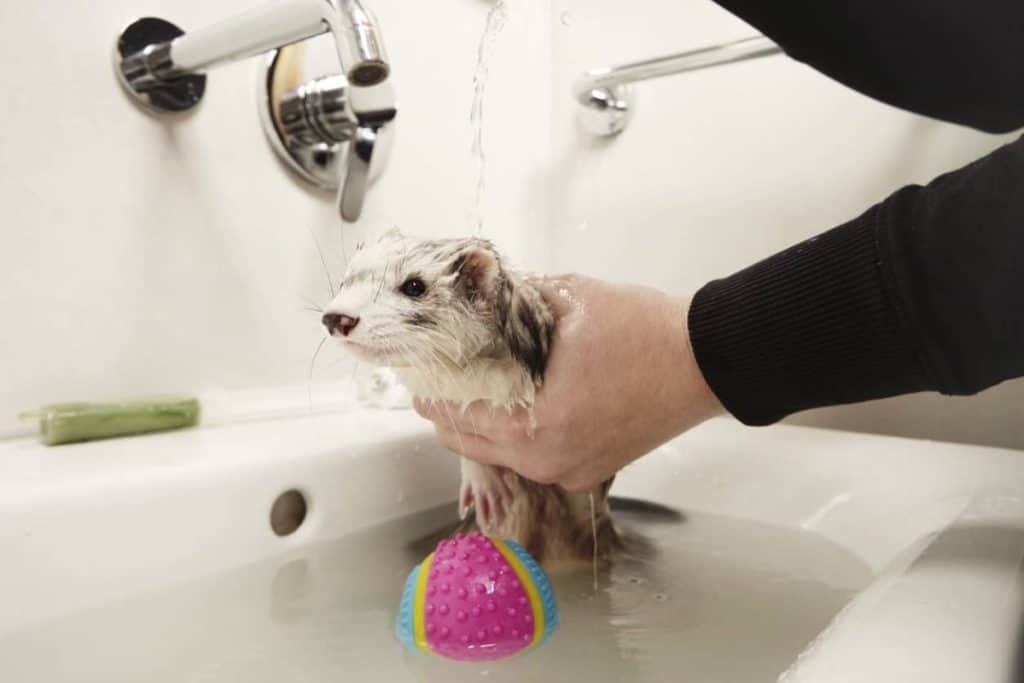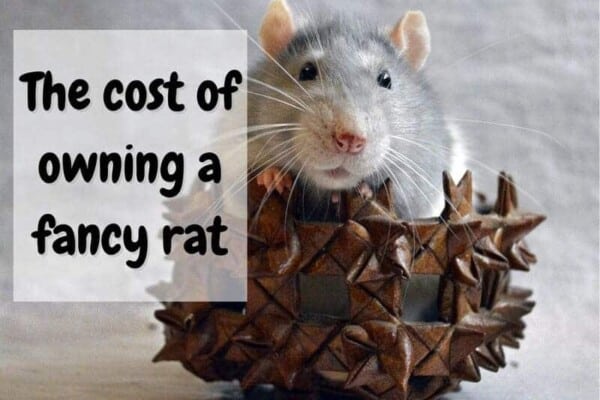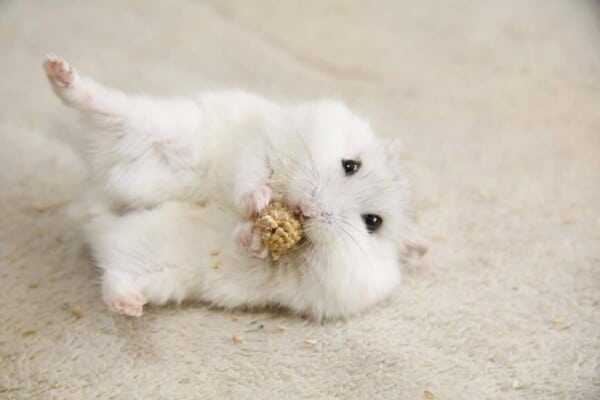Ferrets have a naturally occurring musky odor. Fun fact, their smell is the reason why in Latin ferrets are essentially called “smelly little thieves”. So why do ferrets smell?
Ferrets smell strongly for the same reason plenty of carnivores do – they secrete a strong musky scent from their anal glands. They use these glands to mark their territory or to attract potential mates. But ferrets also have scent glands under their skin all over their body that secrete strong-smelling oils.
Do Ferrets Smell Bad?
Yes, ferrets have a strong, musky smell all over their body. Just like most animals, ferrets mark their territory using their scent, from their anal gland in this case. This is where their strong smell mainly comes from.
Hormones produced by anal glands also help ferrets to find or attract potential mating partners. Although there is no natural population of ferrets on the planet since they are a domesticated species, this in-built mechanism is still present at birth and generally results in the removal of the anal glands by the breeders.
Removing scent glands before sale helps to improve the overall musk from your ferret but there still remain plenty of glands all throughout the skin that adds to their musky smell. That is why “descenting” your ferret may change little to the way it smells for the rest of its life.
5 Grooming Tips For Keeping Your Ferret Hygienic

There are a few tips and tricks you should utilize to keep your ferret as nice and hygienic as possible. A cleaner ferret is a better-smelling ferret after all.
1. Only bathe your ferret every 4 to 6 weeks
Your ferret will only need a bath every 4-6 weeks. Anymore and you can begin to damage their skin or remove the naturally occurring oils that help keep them clean on their own.
2. Use the appropriate shampoo
Ferrets have their own shampoo which you can buy in many pet stores. If you are unable to find ferret-specific shampoo, then kitten shampoo can be used as a substitute. Make sure you check the label clearly to see if the shampoo you wish to purchase is safe for their skin and fur.
3. Use lukewarm water when bathing your ferret
Ferrets should only be bathed at room temperature in lukewarm water. Very warm water is not pleasant for a ferret. Run them a bath in the sink, gently stroke and massage them in the water with shampoo, then pat dry them with a soft towel.
Make sure you don’t overwash your ferret; if you do the oil from the skin will need to be replaced, resulting in an even stronger-smelling ferret.
4. Go easy on ferret shampoo
Ferrets produced natural oils for their hair (like humans do), and washing them too much can remove those oils. Ferrets that lose the oil in their fur have to replace it. They replace it using the same glands you’re trying to mitigate the smell from.
So what happens is in fact by removing the oil, the glands have to work overtime to replace it. Which, is what you are of course trying to avoid.
5. Implement other grooming practices
You should also take care to learn how to clean your ferret’s ears. Use ear-cleaning tools for pets and wet q tips. Never push the q tips into their ears, just gently rub around the outside. This should be done weekly, as opposed to monthly.
A build-up of earwax can cause bad smells just as much as it can inhibit your ferret’s hearing. Cleaning ferrets’ ears can be very tricky, here’s a practical guide designed to make it safer and easier for you.
What to look for when you are washing your ferret
You may be surprised to discover ferrets can actually suffer from hair loss too due to a condition called Alopecia.
If you start to notice unusually large amounts of hair coming away from parts that are usually very hairy, you may want to check it with a vet. If you’ve had your ferret spayed or neutered, the chance of getting Alopecia is much higher.
What products you can use to help your ferret smell better?
There are plenty of products on the market to help your furry friend smell less. Although, you’re only hiding the ferret smell behind perfume of sorts.
The general odor from the ferret will always remain, even if you cover it up you will still be able to smell their musk. If you do choose to use some kind of perfume here are some tips you should absolutely take advantage of.
- Never spray your ferret with perfume: You should never spray anything like that directly onto an animal; instead, you should simply spray a paper towel or hand towel and dab the towel on your ferret.
- Watch the eyes: Perfumes, even pet-friendly ones, should never go near the eyes of your ferret. Only rub the perfume along your ferret’s back; he has glands all over his skin so you’ll still get the desired effect. A better-smelling ferret.
- Don’t overpower your ferret’s nose. Ferrets are not offended by their own musk the same way you might be. They are more likely, though, to be offended by whatever perfume you subject them to, so keep it a mild smell at most.
Environmental changes that can improve the smell of your ferret
- Bedding: The easiest way is to regularly wash all their bedding and hammocks you may have made for them in their enclosure or your home as well as any toys they like to play with.
- Litter Box: Keep their litter box clean. A ferret litter box, like a cat, needs cleaning out as often as possible. You should remove the feces every day, and change the litter bedding at least once a week, while completely washing the litter box at the same time.
- Food bowl: Remember to clean out your ferret’s food bowl every day. Water should be changed every day also.
- Cage: Try your best to wipe down all the surfaces in his cage – your ferret will be trying his best to get his odor into everything to mark his territory.
Resources and further reading:
- Preputial glands of the ferret Mustela furo (Carnivora: Mustelidae), B. Kay Clapperton, R. A. Fordham, R. I. Sparksman













